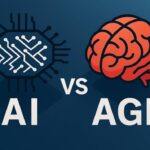
In a world where artificial intelligence is reshaping industries at breakneck speed, are you prepared for the jobs of tomorrow? The AI revolution isn’t just transforming technology—it’s creating entirely new career paths that didn’t exist a decade ago. From turning big data into actionable insights to designing the robots of the future, the opportunities are as exciting as they are diverse.
But here’s the challenge: with AI advancing so rapidly, how do you know which careers will truly thrive in this new landscape? 🤔 The tech job market is evolving faster than ever, and staying ahead of the curve is crucial. That’s why we’ve compiled the Top 7 Tech Careers to Watch in the Age of AI. Whether you’re a seasoned professional looking to pivot or a student planning your future, these roles promise not just job security, but the chance to be at the forefront of innovation.
Ready to discover where your skills fit in the AI-driven world? Let’s dive into the most in-demand tech careers, from data science and machine learning to AI ethics and governance. You’ll learn what each role entails, why it’s critical in the age of AI, and how you can position yourself for success in these cutting-edge fields.
Data Science and Analytics: Turning Big Data into Actionable Insights

A. Essential skills: mathematics, statistics, and programming
In the age of AI, data science and analytics have become crucial career paths. To excel in this field, you’ll need a strong foundation in mathematics, statistics, and programming. These skills will enable you to turn big data into actionable insights, driving business decisions and innovation.
Your mathematical prowess will help you understand complex algorithms and statistical models. Statistical knowledge is essential for interpreting data patterns and making accurate predictions. As for programming, it’s the tool that brings your analytical skills to life.
Here’s a breakdown of the key skills you should focus on:
| Skill Category | Essential Components |
|---|---|
| Mathematics | Linear algebra, calculus, optimization |
| Statistics | Probability theory, hypothesis testing, regression analysis |
| Programming | Data structures, algorithms, object-oriented programming |
B. Key tools: Python, R, Tableau, and SQL
To put your skills into practice, you’ll need to master several essential tools:
- Python: A versatile language for data analysis, machine learning, and web development
- R: Specialized for statistical computing and graphics
- Tableau: Powerful data visualization software
- SQL: The standard language for managing and querying relational databases
These tools will empower you to collect, clean, analyze, and visualize data effectively. Many top employers, including tech giants and Fortune 500 companies, use these technologies in their data science workflows.
C. Major employers: tech giants and diverse industries
Your data science skills are in high demand across various sectors. While tech giants like Google, Amazon, and Facebook are obvious choices, don’t overlook opportunities in other industries:
- Finance: Companies like J.P. Morgan offer internships and full-time positions in quantitative finance and machine learning
- Consulting: Firms are integrating AI and data capabilities into their business practices
- Healthcare: Data-driven insights are revolutionizing patient care and medical research
- Retail: E-commerce companies use data science for personalized recommendations and inventory management
Salaries for data science roles are competitive, ranging from $60,000 for entry-level positions to over $300,000 for senior roles. Many employers also offer attractive benefits, including flexible work arrangements and career development opportunities.
As you develop your data science career, keep in mind that the field is closely connected to machine learning. In fact, machine learning is often considered a subset of data science. With this in mind, next, we’ll explore how machine learning is creating intelligent algorithms and shaping the future of AI.
Machine Learning: Creating Intelligent Algorithms

Now that we’ve explored the world of data science and analytics, let’s dive into the exciting realm of machine learning, where intelligent algorithms are shaping the future of AI.
Core requirements: strong mathematics and computer science background
To excel in machine learning, you’ll need a solid foundation in mathematics and computer science. Your expertise in these areas will be crucial for developing and evaluating complex ML algorithms. Key skills include:
- Advanced mathematics (linear algebra, calculus, statistics)
- Algorithm design and analysis
- Data structures
- Problem-solving and logical thinking
Programming expertise: Python and C++
As a machine learning professional, you’ll be expected to have strong programming skills, particularly in:
- Python: The most widely used language in ML and AI
- C++: Essential for performance-critical applications
Your proficiency in these languages will enable you to:
| Task | Python | C++ |
|---|---|---|
| Prototype ML models | ✓ | |
| Implement data preprocessing | ✓ | |
| Develop production-ready algorithms | ✓ | ✓ |
| Optimize performance | ✓ |
Job responsibilities: developing and evaluating ML algorithms
In your role as a machine learning expert, you’ll be responsible for:
- Creating and fine-tuning ML models
- Analyzing large datasets to extract valuable insights
- Implementing predictive modeling techniques
- Optimizing AI systems for various applications
Your work may span across different industries, including:
- Healthcare: Developing diagnostic tools and personalized treatment plans
- Finance: Creating fraud detection systems and algorithmic trading strategies
- Automotive: Advancing driverless technology and vehicle safety features
- Renewable Energy: Optimizing power systems and predicting energy demand
As you progress in your career, you might find yourself working on cutting-edge projects like:
- Developing chatbots and virtual assistants
- Enhancing computer vision systems
- Improving natural language processing algorithms
- Creating AI-powered recommendation engines
With the rapid advancements in machine learning, your role will continuously evolve, requiring you to stay updated with the latest technologies and methodologies. As we move forward, we’ll explore how the field of robotics is leveraging these intelligent algorithms to design the future of automation.
Robotics: Designing the Future of Automation

Now that we’ve explored the world of machine learning and intelligent algorithms, let’s delve into the exciting field of robotics, where you can design the future of automation.
A. Educational background: engineering and programming proficiency
To excel in robotics, you’ll need a strong foundation in engineering and programming. Your educational journey should include:
- Bachelor’s or master’s degree in robotics, mechanical engineering, electrical engineering, or computer science
- Proficiency in programming languages like Python, C++, and Java
- Knowledge of embedded system design and performance evaluation
B. Key skills: system design and performance evaluation
As a robotics professional, you’ll need to develop the following key skills:
- Robot design and construction
- Advanced programming and testing methodologies
- System integration and troubleshooting
- Performance evaluation and optimization
- Mechanical and electrical engineering principles
C. Prominent employers: Amazon, Google, and Tesla
The robotics field offers diverse career opportunities across various industries. Here’s a comparison of some prominent employers and their focus areas:
| Employer | Focus Area | Example Projects |
|---|---|---|
| Amazon | Warehouse automation | AI-driven sorting systems, drone deliveries |
| AI-powered robotics | Self-driving vehicles, robotic assistants | |
| Tesla | Manufacturing automation | Mechanical welding arms, assembly line robots |
As you pursue a career in robotics, you can expect an average annual salary of $89,662 as a robotics engineer. However, specializing in software or hardware engineering within the robotics field can lead to even higher earning potential, with software engineers making about $110,140 and hardware engineers around $119,560 per year.
To stay competitive in this rapidly evolving field, you should:
- Pursue internships for hands-on experience
- Obtain relevant certifications
- Stay updated on the latest advancements in robotics and AI
With the increasing reliance on automation across industries, your skills in robotics will be in high demand. As we move forward, it’s crucial to consider the security implications of these advanced technologies. In the next section, we’ll explore how you can protect digital assets in the AI era through cybersecurity.
Cybersecurity: Protecting Digital Assets in the AI Era

Now that we’ve explored the exciting world of robotics and automation, let’s delve into another crucial field in the age of AI: cybersecurity. As our digital assets become increasingly valuable and vulnerable, protecting them has never been more important.
A. Required qualifications: computer science degree and security certifications
To thrive in this field, you’ll need a strong foundation in computer science and specialized security certifications. A degree in computer science will give you the technical knowledge required to understand complex systems and AI technologies. Additionally, security certifications such as CompTIA Security+ or Certified Information Systems Security Professional (CISSP) will demonstrate your expertise in protecting digital assets.
B. Focus areas: threat detection and prevention
Your primary focus in this role will be on identifying and mitigating potential threats to digital systems. With the integration of AI, you’ll be working with cutting-edge technologies to:
- Detect anomalies in network traffic
- Analyze large datasets for potential security breaches
- Develop and implement AI-driven security measures
- Stay ahead of emerging AI-specific threats like Adversarial Machine Learning
C. Career opportunities across diverse industries
The demand for cybersecurity professionals with AI expertise is booming across various sectors. Here’s a glimpse of the opportunities available to you:
| Industry | Role | Salary Range |
|---|---|---|
| Technology | AI/ML Security Engineer | $100,000 – $170,000+ |
| Finance | AI Cybersecurity Analyst | $80,000 – $130,000 |
| Healthcare | AI Security Operations Consultant | $90,000 – $150,000 |
| Government | GenAI Security Development Manager | $110,000 – $180,000+ |
These roles require a combination of cybersecurity knowledge and AI expertise. You’ll be responsible for protecting AI models, leveraging AI for threat detection, and developing safety controls for generative AI systems.
As you embark on this career path, you’ll find that the integration of AI in cybersecurity is not just enhancing existing practices but also creating new job roles. Your skills will be in high demand, with over 6,000 AI cybersecurity positions currently available across various employment types.
With this robust foundation in cybersecurity, you’ll be well-prepared to explore the next critical aspect of AI infrastructure. In the following section, we’ll examine how cloud computing is powering the AI revolution and the career opportunities it presents.
Cloud Computing: Powering AI Infrastructure

Now that we’ve explored the critical role of cybersecurity in protecting digital assets in the AI era, let’s shift our focus to the infrastructure that powers AI systems: cloud computing.
A. Expertise in cloud technologies and architectures
As AI continues to reshape industries, your proficiency in cloud technologies and architectures becomes increasingly valuable. You’ll need to master programming languages such as Java, Python, and Go, as well as database management systems like SQL and NoSQL. Familiarity with containerization technologies like Docker and Kubernetes is also essential for designing and managing cloud-based AI solutions.
To excel in this field, you should:
- Develop a strong foundation in computer science or IT
- Gain hands-on experience through practical projects
- Build a professional portfolio showcasing your cloud expertise
- Network within the industry to stay updated on emerging trends
B. Certifications: AWS Certified Solutions Architect
Pursuing certifications from major cloud service providers can significantly boost your career prospects. The AWS Certified Solutions Architect certification is particularly valuable, as it demonstrates your ability to design and deploy scalable, highly available systems on Amazon Web Services.
| Certification Level | Salary Range | Key Skills |
|---|---|---|
| Associate | $100,000 – $130,000 | Cloud architecture, security, networking |
| Professional | $130,000 – $170,000 | Advanced design patterns, migration strategies |
C. Role: designing and managing cloud-based solutions
As a cloud computing professional, you’ll play a crucial role in designing and managing cloud-based solutions that power AI infrastructure. Your responsibilities may include:
- Implementing security measures to protect sensitive AI data
- Optimizing cloud resources for AI workloads
- Ensuring seamless integration of AI applications with cloud services
- Monitoring and improving the performance of AI systems in the cloud
You’ll also need to stay informed about ethical considerations in AI deployment, such as bias mitigation and transparency. By addressing these challenges, you’ll be at the forefront of AI-driven cloud transformations.
With cloud computing expertise, you’re well-positioned to transition into AI engineering, where you’ll bridge the gap between theoretical AI concepts and practical implementation. In the next section, we’ll explore how AI engineering combines cutting-edge algorithms with real-world applications.
AI Engineering: Bridging Theory and Practice

Now that we’ve explored how cloud computing powers AI infrastructure, let’s delve into the exciting world of AI Engineering, where theory meets practice in the realm of artificial intelligence.
A. Average salary: $111,913
As an AI Engineer, you can expect to earn a competitive salary, with the average annual income standing at $111,913. This reflects the high demand for skilled professionals in this field and the value they bring to organizations.
B. Key responsibilities: developing AI applications and systems
Your primary role as an AI Engineer will be to develop applications and systems that enhance organizational efficiency. You’ll be at the forefront of creating intelligent solutions that leverage the power of AI to solve complex problems and drive innovation.
C. Required skills: programming and AI fundamentals
To succeed in this role, you’ll need a strong foundation in both programming and AI fundamentals. Here’s a breakdown of the essential skills you should focus on:
- Programming languages:
- Python (most commonly used in AI)
- Java
- C++
- AI and Machine Learning concepts:
- Neural networks
- Deep learning
- Natural Language Processing (NLP)
- Frameworks and tools:
- TensorFlow
- PyTorch
- Scikit-learn
| Skill Category | Examples |
|---|---|
| Programming | Python, Java, C++ |
| AI Concepts | Neural networks, Deep learning, NLP |
| Tools | TensorFlow, PyTorch, Scikit-learn |
To prepare for a career in AI Engineering, consider pursuing relevant degrees in computer science or data science. You can also enhance your skills through certifications and online courses, such as Google’s AI Essentials or Microsoft’s AI & ML Engineering Professional Certificate.
Remember, the field of AI is rapidly evolving, so continuous learning and staying updated with the latest advancements will be crucial for your success. You may also want to gain practical experience through internships or freelance projects to build your portfolio and network within the industry.
As we look ahead to the next section on AI Ethics and Governance, it’s important to note that your role as an AI Engineer will increasingly involve considering the ethical implications of the systems you develop. Ensuring responsible AI development will be a key aspect of bridging theory and practice in this exciting field.
AI Ethics and Governance: Ensuring Responsible AI Development

Now that we’ve explored AI Engineering and its role in bridging theory and practice, let’s delve into the critical realm of AI Ethics and Governance. As AI technologies continue to shape our world, ensuring responsible development has become paramount.
A. Emerging role: AI Ethics Officer
You might find yourself at the forefront of responsible AI development as an AI Ethics Officer. This role is gaining prominence across various sectors, including technology, healthcare, finance, and government. As an AI Ethics Officer, you’ll be responsible for:
- Evaluating AI systems for ethical issues
- Developing guidelines and policies
- Conducting algorithm audits
- Engaging with stakeholders
- Educating the public about AI ethics
B. Focus: responsible data use and ethical AI implementation
Your primary focus will be on ensuring that AI technologies adhere to principles of:
- Fairness
- Transparency
- Accountability
You’ll play a crucial role in fostering trust and compliance with regulations. This involves:
- Assessing the ethical implications of AI technologies
- Implementing safeguards to protect user privacy
- Ensuring AI systems are free from bias and discrimination
- Promoting responsible data use practices
C. Interdisciplinary approach: combining technology and ethics
To excel in this field, you’ll need to adopt an interdisciplinary approach. This involves:
| Technical Skills | Ethical Knowledge |
|---|---|
| AI technologies | Ethical theory |
| Data science | Regulatory frameworks |
| Machine learning | Societal norms |
You’ll also need strong analytical and communication abilities to bridge the gap between technical teams and stakeholders. As you navigate this career path, you can expect:
- Salaries ranging from $60,000 to $120,000+, depending on experience and location
- Opportunities in Silicon Valley, Boston, Washington D.C., London, and Toronto
- Potential roles in government advisory, AI governance teams, consulting firms, and academia
By pursuing a career in AI Ethics and Governance, you’ll contribute to shaping a future where technology serves humanity responsibly. Your work will be essential in addressing the ethical challenges of AI and ensuring its positive impact on society.

As we’ve explored the top 7 tech careers in the age of AI, it’s clear that the job market is evolving rapidly. From Data Science and Analytics to AI Ethics and Governance, these fields offer exciting opportunities for those looking to stay ahead in the tech industry. Each role requires a unique blend of technical skills, critical thinking, and adaptability to thrive in this dynamic landscape.
To succeed in these AI-driven careers, you’ll need to embrace continuous learning and stay updated on the latest advancements. Consider pursuing relevant certifications, engaging in open-source projects, and building a robust portfolio to showcase your skills. Remember, the future of AI is not just about technical prowess but also about responsible development and ethical considerations. By focusing on these aspects, you’ll be well-positioned to make a significant impact in the world of AI and contribute to shaping the technology of tomorrow.


